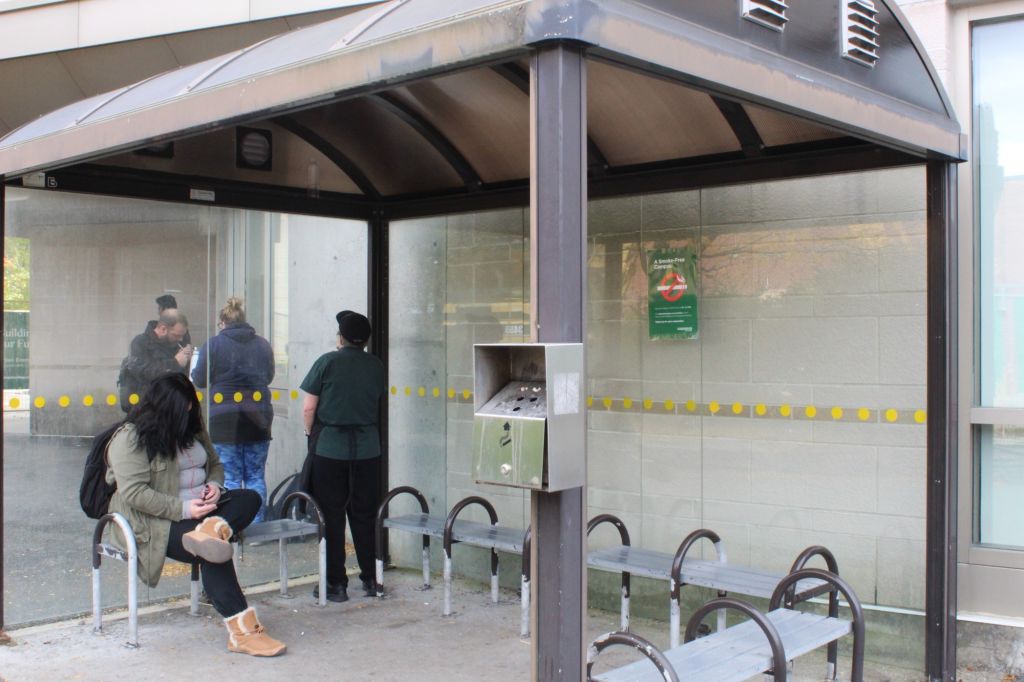There’s a cloud of smoke set to lift on Algonquin’s Ottawa, Perth and Pembroke campuses with the implementation of the college’s interim smoking ban on Oct. 15.
The policy, announced on Oct. 5, followed the provincial government announcing it would be permitting the use of marijuana wherever tobacco smoke is currently allowed.
Algonquin president Cheryl Jensen sat down with the Times Oct. 11 to help answer some questions students might have about the smoking ban.
She was upfront about the fact that this sudden policy change is a reaction to cannabis legalization.
“When the Premier announced you could smoke cannabis wherever you smoke tobacco, that changed the rules for us,” she said. “That changed the whole landscape of where we were going.”
Initially, the college was under the assumption that cannabis use would be treated like alcohol.
“We never thought it would be allowed,” Jensen said. “The comparison we made was you can’t walk around with an open bottle of beer…we have no appetite for allowing cannabis to be smoked on campus freely.”
The main difference between alcohol and marijuana and the one causing issues for the college is the lack of regulation around marijuana consumption that currently exist for alcohol.
“We have a student-run pub which meets all of the LCBO liquor standards in terms of being licensed to sell alcohol,” she explained. “It’s not open at 8 a.m., there are rules for when you can have a beer.”
Regardless of the timing, Jensen feels this new policy is consistent with the direction the college was already headed in.
“It was our intent to certainly investigate a smoke-free campus without this news,” she said. “We want to portray this as part of our healthy living initiative. we feel that this is a logical extension of that.”
Even though this ban prohibits tobacco use as well, Jensen is clear about where she stands on the issue of cannabis use on campus.
“I feel strongly about this,” she said. “It’s a mind-altering drug. And I don’t see allowing our employees and our students to ingest mind-altering drugs and attending class; to me doesn’t fit in with our mission.”
While it still may be a year away, Jensen says the college will also be looking at amending policy once marijuana becomes legal in edible form as well.
“My first impression is that edibles would be controlled as alcohol is controlled,” she said. “Of course we will be bound by those regulations.”
However, even though the focus has much to do with cannabis use, Jensen is aware of the effect this new policy will have on students and staff who smoke tobacco.
“This comes with challenges for students and our employees who smoke tobacco,” she said. “I’m sure just saying that we will no longer have smoking on the campus is causing them anxiety.”
If you are a smoker who sees this an opportunity to quit, the college will be providing additional support once the policy comes into effect.
“What we will be doing time is ramping up our smoking cessation programs,” Jensen said. “We have mental health resources here at the college, we have counselling; there are all kinds of other ways to deal with stress other than smoking.”
Unfortunately, if you are a staff member or student who still enjoys their cigarette break, you may have to start accounting for added travel time.
“There may be other places where you can smoke, just not on this property,” she said. “It will be harder for people to take a break and have a cigarette.”
During the interim ban, which ends on Jan. 1, 2019, Jensen says the college wants to focus on education rather than punitive measures to enforce the ban, but it will be enforced.
“The soft launch doesn’t mean that we’ll just say that’s okay you can smoke; it’s not allowed,” she said. “As of Monday, there’ll be signs all over the campus internally and externally for that.”
The college won’t be adding any extra security measure to monitor adherence to the ban- that will be covered under the normal duties of campus security- though they will be examining what changes will ultimately have to be made once the initial phase ends.
“Jan. 1. is a complete policy change,” she said. “We will have at that point, through consultations, decided what we do if people are blatantly disregarding the rules.”
As for where exactly smokers are supposed to go if they want to light up, the college is still working on an answer.
“We’ll have to work with the city and with public health because we don’t want to move the problem into somebody else’s backyard,” Jensen explained.
As for the fate of the shelters in place on campus to protect smokers from the elements, their time could be coming to an end as well.
“It could be total removal,” Jensen said. “Unless I’m convinced [otherwise] the smoking shelters will go.”
Once the ban goes into effect, Algonquin will join four other Ontario Colleges that have already gone smoke-free: McMaster University, George Brown College, Redeemer University College and Western University.
St. Lawrence announced its Kingston, Brockville and Cornwall campuses will be implementing a similar ban on Oct. 15. as well.
If you are a smoker holding out hope that once the province lays out more rigid guidelines for consumption of marijuana and that the college will allow tobacco smoke back on campus, you may have already enjoyed your last cigarette on campus.


